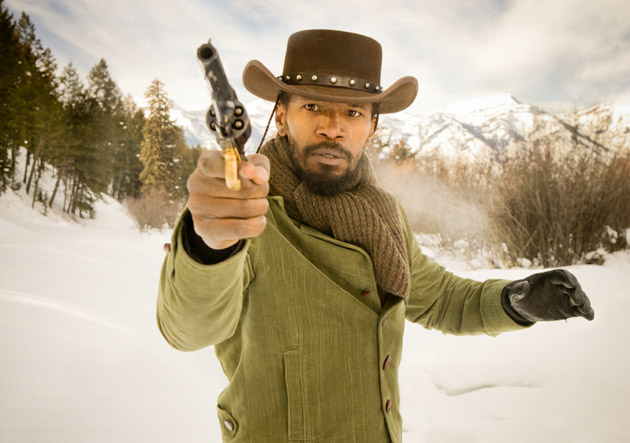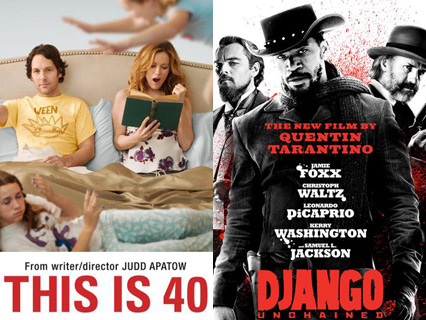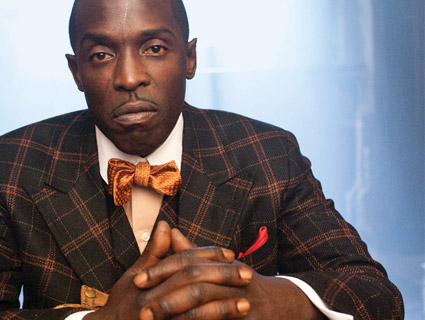
WARNING: This post contains multiple spoilers.
Every time Jamie Foxx’s character Django rides into town in Quentin Tarantino’s new spaghetti Western Django Unchained, set against the backdrop of American chattel slavery, someone asks some variation of the question, “What is that nigger doing on a horse?”
This is as much a threat as an inquiry. Almost every character who asks it is involved in trying to tear Django off the horse, because a black man on a horse is a threat to a strict racial hierarchy that even those who cannot afford a horse hold dear. It’s a question that Tarantino might even assume his own audience members are asking, since the iconic American gunslinger is nearly always white. It’s also a question that might well have been asked by the protagonists of America’s classic Westerns, from Rooster Cogburn to Ethan Edwards to Josey Wales—all former Confederate soldiers who committed treason in defense of slavery.
The lionization of the Lost Cause and the Confederacy runs like an inedible streak of gristle through the revenge Western genre, where those who fought to protect the rights of whites to own blacks as property are humanized while those who fought to preserve the Union are recalled as monsters. Blacks, if they appear, serve merely to bolster the lie that the Civil War wasn’t about slavery. The trope of the wronged former Confederate is alive and well, whether excised from its historical context (Firefly) or hilariously rationalized for new audiences (Hell on Wheels).
Django is an inversion of the genre, where the loner seeking revenge is a former slave instead of a former Confederate; where the alien savages who stole his life from him are white, as is the sidekick with the nonexistent past: Tarantino hasn’t simply flipped the notion of a Western hero, he’s even given him an inverted Magical Negro sidekick in the character of King Shultz, a German abolitionist bounty hunter who appears out of the ether to free Django, and dies to facilitate his revenge—much as the death of Ned Logan (Morgan Freeman) sets off Clint Eastwood’s character in Unforgiven. Except in Django, deserves has everything to do with it. Django kills white people like he’s trying to make up for a century of on-screen genocide in Western films where black, Latino, and Native American antagonists are treated like disposable pocket litter. The only white man in Tarantino’s Mississippi who survives meeting Django is played by Franco Nero, his Italian namesake.
If the box office take is any indication, Tarantino has not only accomplished all of this genre-busting, but has managed to do it while making white people enjoy watching what is essentially a two-hour-plus lecture on racism in American film, an extended fuck you to DW Griffith and John Ford, John Wayne, and Clint Eastwood.
The film has provoked the usual controversy over language, violence, and historical accuracy—this is Tarantino, after all, and vivid cinematic depictions of American slavery are so rare in film that Django takes on outsize importance. It is also one of the few films to convey how arbitrary, cruel, and brutal slavery was—Kerry Washington, who plays Django’s wife Brumhilda, told Vibe that she had initially thought the gothic metal masks seen on slaves throughout the film were Tarantino’s invention. (They were not.) Tarantino himself is aware that he hasn’t even come close to portraying the horrors of slavery, telling an audience, “As bad as some of the shit is in this film, a lot worse shit was going on. This is the nice version.”
The acclaimed director Spike Lee slammed the film as disrespectful to slavery without having seen it. Writer Ishmael Reed called it an “abomination” and suggested white people avoid producing fiction about slavery. Part of the reason for the controversy is that the film is peppered with the word “nigger” throughout. It’s hard to take seriously most critics who complain that their ears are too delicate to stand the repetition of such words—I assume that what guys like the esteemed film critic Matt Drudge most object to is white people being portrayed as overtly racist in a world where the line between racism and not racism has been reduced to whether or not one uses certain naughty words.
More worthy of consideration is Jelani Cobb in The New Yorker accusing the director of “racial ventriloquism, a kind of camouflage that allows Tarantino to use the word without recrimination.” But Tarantino’s previous offerings make far riper targets: The racial ventriloquism charge is more fittingly applied to a white person who “gets away” with using the loathsome word by channeling it through a black character. In Django it is racist whites who spout the word most frequently, thus obliterating any racial alibi.
Django, like many Tarantino films, also has been criticized as cartoonishly violent, but it is only so when Django is killing slave owners and overseers. The violence against slaves is always appropriately terrifying. This, if nothing else, puts Django in the running for Tarantino’s best film, the first one in which he discovers violence as horror rather than just spectacle. When Shultz turns his head away from a slave being torn apart by dogs, Django explains to Calvin Candie—the plantation owner played by Leo DiCaprio—that Shultz just isn’t used to Americans.
Django works best as film criticism; it certainly doesn’t work as history. A key plot point, wherein Django and Shultz pretend to be a slave traders seeking a champion “Mandingo fighter” from Candie, is ahistorical—slave fights to the death were relatively rare because slaves were expensive. (Tarantino appears to have drawn the idea from the 1970s blaxploitation flick Mandingo.) As Cobb points out in his critique, were this our only exposure to slavery, we might assume that violent resistance among slaves was rare, never mind the history of blacks fighting alongside the Union (Django is set two years before the Civil War) and the many rebellions and escape attempts that occurred before the war.
Cobb asks, “Is this how Americans actually perceive slavery?” and answers sadly that, yes, the idea that most blacks quietly acquiesced to slavery is pervasive and may even be enhanced by Django, despite Brumhilda’s attempts to escape on her own or the scene at the beginning of the film in which a group of slaves kill a trapped slaver. I generally agree with Cobb on this question, though he fails to identify a similar problem with Tarantino’s 2009 ethnic revenge flick, Inglourious Basterds. Both films might leave the impression that that Jews and blacks could have ended their persecution if only they had been gangsta guerrilla superheroes.
Django‘s greatest weakness, particularly given the topic of resistance, are its women characters. The director of Kill Bill should have been able to make Brumhilda more than a damsel in distress, particularly since Shoshanna, the main female protagonist in Basterds, not only engineers Hitler’s death but defies both the Nazis and her own Jewish heritage by falling in love with a non-Jew.
Issues of gender were central to slavery—modern gynecology began with nonconsensual medical experiments on enslaved woman—but Tarantino’s lingering hang-ups about masculinity remain a severe blind spot. We learn that the shuffling of Samuel Jackson’s Stephen is an act, but I kept waiting to learn whether the same was true of Candie’s slave concubine Sheba—the film never considers her perspective important enough to make it clear.
The flip side of Cobb’s argument, of course, is that given our general ignorance about slave resistance, Django‘s audiences may be learning of it for the first time and be inspired to learn more. For Django to communicate the misperception that slaves did not resist would require some initial knowledge that they resisted more than the movie suggests—Cobb himself notes that few people seem aware of any slave resistance at all.
Perhaps most disturbing to Cobb is that the primary antagonist in the end is not Candie, but his self-serving house slave Stephen, Jackson’s character. Cobb complains that “a white director holds an obsequious black slave up for ridicule,” and in doing so is “disrespectful to the history of slavery.” The image of white folks in movie theaters guffawing at souls being ground to dust under the foundations of American civilization leaves a bitter taste. Even if Stephen is monstrous, what right have they to judge him, let alone laugh?
Part of the joke, it seems, is that casting Jackson as a superficially subservient house Negro was an act of great cinematic irony. As Jackson put it in a recent interview, “Fifteen years ago I could have played Django, now I can’t. Now you (Tarantino) want me to play the most hated Negro in cinematic history.” Stephen is not simply some live-action Uncle Ruckus; he is as openly defiant of Candie as his mask will allow. When he summons Candie into a parlor to reveal Django and Shultz’s plot to free Brumhilda, he sips from a snifter of brandy and his Uncle Ben accent is gone. Later, we learn that even his limp is fake. Unlike the happy slaves of prior films, Stephen doesn’t appear to have any personal love for Candie, but the owner facilitates some limited freedom for Stephen because without him, Candie cannot hold his racial caste system together. As Jackson describes it, Stephen is the plantation’s “Dick Cheney,” wearing the mask that grins and lies only because it affords him some measure of agency within a system meant to deny it. He’s the twisted mirror image of Django, because while Stephen is smart and capable enough to subvert the system, he has instead chosen to benefit from it. This provides narrative symmetry for Tarantino, but it also raises a question that the director seems ill-prepared to handle. Stephen’s internalizing of his master’s crank scientific racism is easy enough to understand, but as Cobb points out, it’s not funny.
Flawed as Django may be, it remains a deeply satisfying rebuke to racism in Western cinema. Cobb writes that “a response to slavery—even a cowardly, dishonorable one like what we witness with Stephen—highlights the depravity of the institution.” I couldn’t agree more, and that’s why I think Django is far superior to Basterds. Nazis are the original disposable foreign antagonists, whereas Django’s enemies are a part of American history and of a type occasionally viewed as Western heroes. Basterds gives Jews a taste of revenge fantasy by “killin Nazeez,” but it’s uninterested in the system of global anti-Semitism that led to the Holocaust. With Django, the institution is the villain. We are constantly reminded, visually and narratively, that it is slavery that twists hearts, shatters lives, and erases families.
Even Schultz, the abolitionist sidekick, tells Django he’s relieved that Django, being a slave, cannot refuse to help him. Tarantino is saying that no white person, no matter how good, can extract themselves from a system so pervasive. No one—no one—walks away from Django with the perception that slavery was anything but monstrous. Perhaps lovers of Westerns may even walk out understanding what some of their most memorable “heroes” were actually fighting for.













